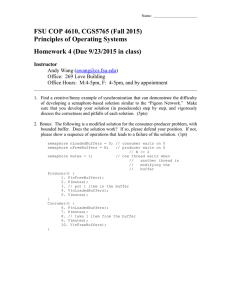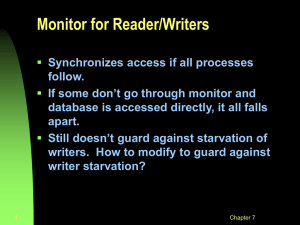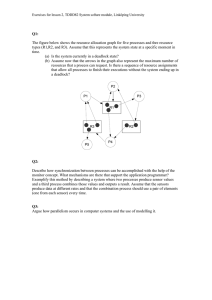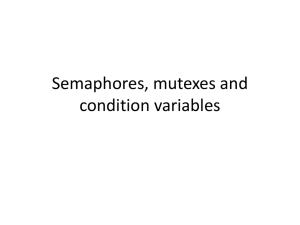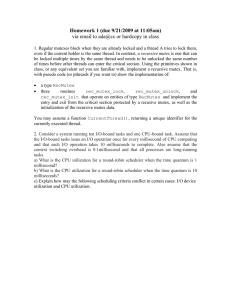IPC and Classical Synchronization Problems
advertisement
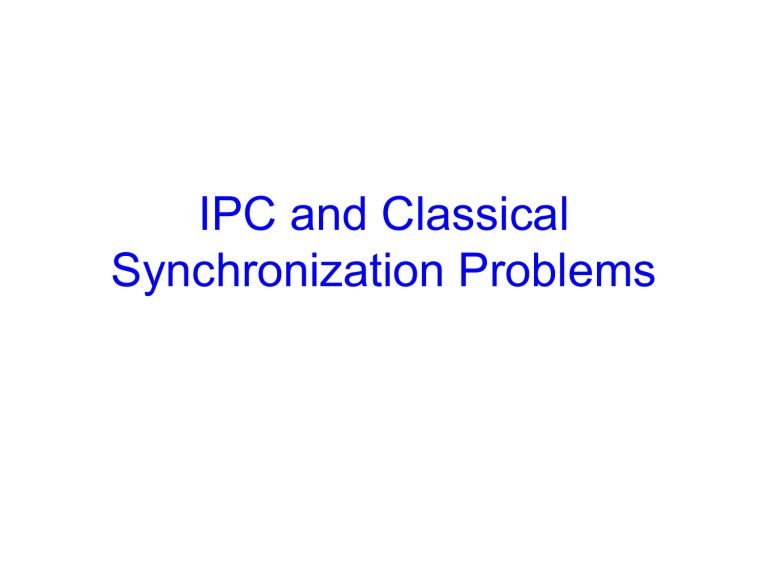
IPC and Classical
Synchronization Problems
How do processes communicate?
• IPC (Inter Process Communication)
– Mechanism to exchange data
• Why?
–
–
–
–
Share information
Computational speedup
Modularity
Convenience
• Why not use threads?
– Functionality, manufacturers, …
IPC: Message Passing
• OS provided mechanism
• Address space is NOT shared
• Process use 2 operations:
– send(message)
– receive(message)
• Size of message:
– Fixed: simple implementation but difficult to use
– Variable: commonly used
Naming
• Direct communication
– Explicitly name the end-point
• Link is between exactly two processes
• Between any two processes there is only one link
– Symmetric:
• Name the endpoints
• Send(P, msg) and Receive(Q, msg)
– Asymmetric:
• Receive does not name endpoint
• Send(P, msg) and Receive(id, msg)
Hard coding required!
Naming
• Indirect communication: Mailbox or ports
– Messages sent and removed from a mailbox
– Link can be between more than 2 processes
– More than 2 processes can share a link
• Who owns the mailbox?
– Process:
• Different from shared memory
– Owner is the receiver
– Other processes can only send
– OS:
• System calls to create, communicate and delete mailboxes
• Ownership of mailbox can be passed using system calls
IPC: Shared Memory
•
•
•
•
Memory is shared among processes
Shared memory is part of a process’s address space
The part to be shared is decided by process and not OS
Example: POSIX
Comparing these schemes
• Message passing:
– Easier to implement
– No conflicts to consider, good for small data transfers
– Example: MPI
• Shared memory
– Faster for local transfers
– Cheriton’84 to make message passing fast
• Distributed Shared Memory vs Message Passing
– Distributed computation?
– Multiprocessor architectures?
Synchronization Problems
•
•
•
•
Producer-Consumer Problem
Readers-Writers Problem
Dining-Philosophers Problem
Sleeping Barber Problem
Producer-Consumer Problem
• Unbounded buffer
• Producer process writes data to buffer
– Writes to In and moves rightwards
• Consumer process reads data from buffer
– Reads from Out and moves rightwards
– Should not try to consume if there is no data
Out
In
Need an infinite buffer
Producer-Consumer Problem
• Bounded buffer: size ‘N’
• Producer process writes data to buffer
– Should not write more than ‘N’ items
• Consumer process reads data from buffer
– Should not try to consume if there is no data
In
Out
Producer-Consumer Problem
• A number of applications:
– Compiler’s output consumed by assembler
– Assembler’s output consumed by loader
– Web server produces data consumed by client’s web browser
• Example: pipe ( | ) in Unix
– > cat file | more
– > prog | sort … what happens here?
Producer-Consumer Problem
First attempt to solve:
Producer
Shared: int counter;
any_t buffer[N];
Init: counter = 0;
while (true) {
/* produce an item in nextProduced*/
while (counter == N)
; /* do nothing */
Consumer
buffer[in] = nextProduced;
in = (in + 1) % N;
while (true) {
counter++;
while (counter == 0)
}
; /* do nothing */
nextConsumed = buffer[out];
out = (out + 1) % N;
counter--;
/* consume an item in nextConsumed*/
}
Producer-Consumer Problem
Shared: Semaphores mutex, empty, full;
Init: mutex = 1; /* for mutual exclusion*/
empty = N; /* number empty bufs */
full = 0;
/* number full bufs */
Producer
Consumer
do {
...
// produce an item in nextp
...
P(empty);
P(mutex);
...
// add nextp to buffer
...
V(mutex);
V(full);
} while (true);
do {
P(full);
P(mutex);
...
// remove item to nextc
...
V(mutex);
V(empty);
...
// consume item in nextc
...
} while (true);
Readers-Writers Problem
• Courtois et al 1971
• Models access to a database
• Example: airline reservation
Readers-Writers Problem
•
•
•
•
•
Many processes share a database
Some processes write to the database
Only one writer can be active at a time
Any number of readers can be active simultaneously
This problem is non-preemptive
– Wait for process in critical section to exit
• First Readers-Writers Problem:
– Readers get higher priority, and do not wait for a writer
• Second Readers-Writers Problem:
– Writers get higher priority over Readers waiting to read
• Courtois et al.
First Readers-Writers
Shared variables: Semaphore mutex, wrl;
integer rcount;
Init: mutex = 1, wrl = 1, rcount = 0;
Writer
do {
P(wrl);
...
/*writing is performed*/
...
V(wrl);
}while(TRUE);
Reader
do {
P(mutex);
rcount++;
if (rcount == 1)
P(wrl);
V(mutex);
...
/*reading is performed*/
...
P(mutex);
rcount--;
if (rcount == 0)
V(wrl);
V(mutex);
}while(TRUE);
Readers-Writers Notes
• If there is a writer
– First reader blocks on wrl
– Other readers block on mutex
• Once a writer exists, all readers get to go through
– Which reader gets in first?
• The last reader to exit signals a writer
– If no writer, then readers can continue
• If readers and writers waiting on wrl, and writer exits
– Who gets to go in first?
• Why doesn’t a writer need to use mutex?
Dining Philosopher’s Problem
• Dijkstra
•
•
•
•
Philosophers eat/think
Eating needs two forks
Pick one fork at a time
How to avoid deadlock?
Example: multiple processes competing for limited resources
A non-solution
# define N
5
Philosopher i (0, 1, .. 4)
do {
think();
take_fork(i);
take_fork((i+1)%N);
eat(); /* yummy */
put_fork(i);
put_fork((i+1)%N);
} while (true);
Will this work?
Shared: semaphore fork[5];
Init: fork[i] = 1 for all i=0 .. 4
Philosopher i
do {
P(fork[i]);
P(fork[i+1]);
/* eat */
V(fork[i]);
V(fork[i+1]);
/* think */
} while(true);
Dining Philosophers Solutions
• Allow only 4 philosophers to sit simultaneously
• Asymmetric solution
– Odd philosopher picks left fork followed by right
– Even philosopher does vice versa
• Pass a token
• Allow philosopher to pick fork only if both available
One possible solution
Shared: int state[5], semaphore s[5], semaphore mutex;
Init: mutex = 1; s[i] = 0 for all i=0 .. 4
Philosopher i
do {
take_fork(i);
/* eat */
put_fork(i);
/* think */
} while(true);
take_fork(i) {
P(mutex);
state[i] = hungry;
test(i);
V(mutex);
P(s[i]);
}
put_fork(i) {
P(mutex);
state[i] = thinking;
test((i+1)%N);
test((i-1+N)%N);
V(mutex);
}
test(i) {
if(state[i] == hungry
&& state[(i+1)%N] != eating
&& state[(i-1+N)%N != eating)
{
state[i] = eating;
V(s[i]);
}
